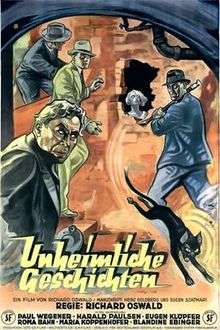Unheimliche Geschichten (1932 film)
Unheimliche Geschichten (Uncanny Stories) is a 1932 German horror/comedy film directed by the prolific Austrian film director Richard Oswald, starring Paul Wegener, and produced by Gabriel Pascal.
| Unheimliche Geschichten | |
|---|---|
 | |
| Directed by | Richard Oswald |
| Produced by |
|
| Screenplay by |
|
| Starring |
|
| Music by |
|
| Cinematography | Heinrich Gärtner[1] |
| Edited by |
|
Production companies |
|
Release date |
|
| Country | Germany[1] |
The story is a merging of three separate short stories, Edgar Allan Poe's The Black Cat, The System of Doctor Tarr and Professor Fether and Robert Louis Stevenson's The Suicide Club, set within a story frame of a reporter's hunt for a crazy scientist. It is a black comedy revisiting many of the classic themes of the horror genre. It was Paul Wegener's first talking movie.
Plot
A crazed scientist, Morder (Paul Wegener), driven even crazier by his nagging wife, murders her and walls her up in a basement, a la Poe's The Black Cat. He then flees as the police and a reporter, Frank Briggs (Harald Paulsen), set out to track him down. Morder eventually escapes, by pretending to be insane, into an asylum. Though here the patients has managed to free themselves, lock up the guards, and take charge (inspired by Poe's The System of Doctor Tarr and Professor Fether). After Morder's final escape, he turns up as president of a secret Suicide Club (based on the short story by Stevenson).
Cast
Release
Unheimliche Geschichten was released in Germany on 7 September 1932.[1]
Reception
In contemporary reviews, Variety declared in 1932 that Oswald had "succeeded in creating an effectively gruesome picture",[2] specifically praising the sound, acting and photography as "excellent".[2] In 1940, Bosley Crowther reviewed the film under the title The Living Dead for the New York Times, declaring it "a nightmare reminder of the old pre-Nazi macabre school of German films, which did all right by such things as M, but apparently had its bad moments, too."[3]
See also
Footnotes
- "Unheimliche Geschichten". Filmportal.de. Retrieved May 13, 2016.
- Rigby 2017, p. 43.
- Rigby 2017, p. 44.
References
- Rigby, Jonathan (2017). Euro Gothic. Signum Books. ISBN 978-0-957-64815-9.CS1 maint: ref=harv (link)